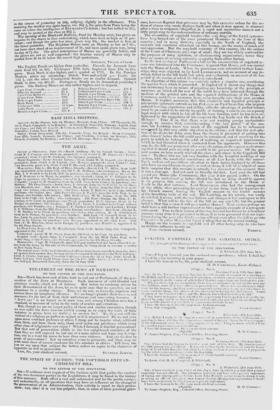THE SPIRIT OF FACTION: THE COPYIIOLI) ENFR AN- CHISEM ENT
BILL.
TO THE EDITOR OF TIIE SPECTATOR.
SIR—If evidence were required of the factious spirit that guides the conduct of the two dominant parties in the Legislature, it may be found in the history of this measure. Both affect a vast and unbounded zeal for the public service ; and undoubtedly, on all questions that may have an influence on the changeor the preservation of an Administration, their activity is equal to their profes- sions; but, alas: it is not less palpable, that, in cases of mere practical gtaev-
anee, however flagrant that grievance may be, this excessive ardour for the re- dress of abuses very rarely displays itself, and when it does appear, is observed after a time to evaporate altogether, in a rapid and mysterious manner not a little perplexing to the understandings of ordinary mortals. The absurdities of copyhold tenure—the very dregs of the feudal system—•
have long formed one of the most prominent blemishes in the laws of this country ; and in many districts, especially in the North of England, the customs and exactions attendant on this tenure, arc the source of much evil. and oppression. But the copyhold tenantry of this country, like the suitors of the Court of Chancery, are a rope of sand ; they are too widely scattered for the purposes of noisy agitation, or electioneering organization; hence they have no means of sec.aring extensive sympathy from either faction. In the last session of Parliament a bill for the commutation of copyhold te- nure was introduced into the Coannons; it passed that House, and was carried into the House of Lords. When its provisions were submitted to their Lord- ships, they were objected to by Lord LvisnounsT, not on account of any in- trinsic defect in the bill itself, but solely and exclusively on account of die late period of 111.- scssion at which the hill was introduced.
An objection of this nature was certainly rather a singular one, considering the quarter from which it proceeded. It implied (if it meant any thing) that our aristocracy have no means of acquiring any knowledge of the principle of measures on which till the rest of the world have been informed through the medium of the printed acts and the reported deliberations of the House of Commons, until those measures have come formally into their own peculiar House. It implied, moreover, that this admirable and dignified principle of arisIocratic ignorance extends so far, that even an Ex-Chancellor, who to great judicial learning, experience, and ability, folds the advantage of perfect leisure, must he presumed to lie utterly incapable of forming a conclusion on a purely legal subject with which be has all his lire been familiar, until he has been en- lightened by the suggestions of his coliTeors the Lay Lords and the Bench of Bishops I True it is, that there wore not wanting gossips uncharitable enough to surmise that, not withs'antling `t the late period" of the ses- sion, Ins Lordship knew too touch of &e copyhold law to be influenced over such by this very subtle objection to its reform ; and that the real solu- tion of his desire thr delay arose from the chance it presented of getting into office hints.?/' before the bill could again lie introduced. and of reserving our the party to which he belongs the eclat of realizing an important improvement, which lie had thwarted when it emanated from Iris Orp0111.11l5. However this may be, the bill was postponed after tenure alteration, on the express understand- ing that it should pass as early as possible in the pascal s..rs;:ol. Of the pre- sent session we have nearly reached the close' and where is the Copyhold Bill now :".ro those who are not very familiar with the beautiful workings of our system, with the woutkifill cousistency of all I,aw Lords, with the marvel- lomiv zealous and punoiliosts attention to their duties displayed by all these who lave no could (tomtits to guide or molest them, it will be a subject of some little surprise that this measure is actually ss fin.a.tird at this moment than it was a year ago. And yet such is literally the fact. Last year the hill had. passed one House (the ('ommons) • this y ear it has passed neither. On the faitht of the underst,tairag before alluded to, that no delay should be opposea to its progress this session, the hill wars introduced in the House of Lards In the first instance. Lord 111tolftsitAm, who had the management of the affair, oilier presenting his profite in due form, took his departure for his French manor, leaving the English manors to the tender mercies of the hereditary lords of the soil. His Lordship, on his return, was vastly dissatisfied, it seems. with the nothilsttions and changes it had undergone in his sthsenee. What will be tl,. foe of the Bill no one can tell ; but the general. belief is that this session it %iill pass neither (loose! Next session perhaps we shall have a still further iinproeenient in this exquisite example of a retrograde movement. True to their sysdent of showing less and less bivuur to a beneficial measure every time it is presenti'd to them, it is to be presumed that our legis- Istors during the !sex: (t Lc t Isird):;,,,i011 will not even allow tine hill to go into Csmfffiff foe in either noise, last reject it altogether on the second reading. Happy are the tenants in copyhold and all other loving subjects who have no fallout, influence to rely on.
olleslient servant,
TARDUS.


























 Previous page
Previous page